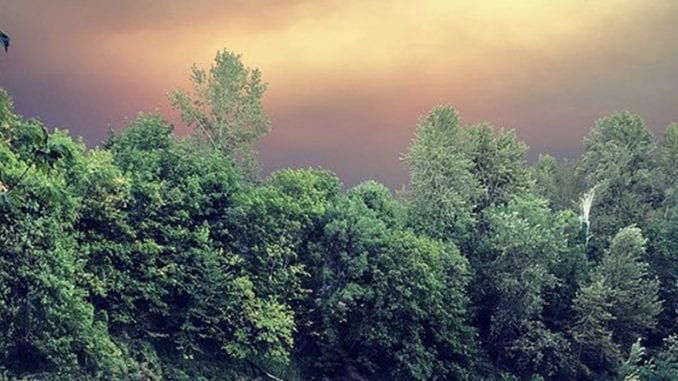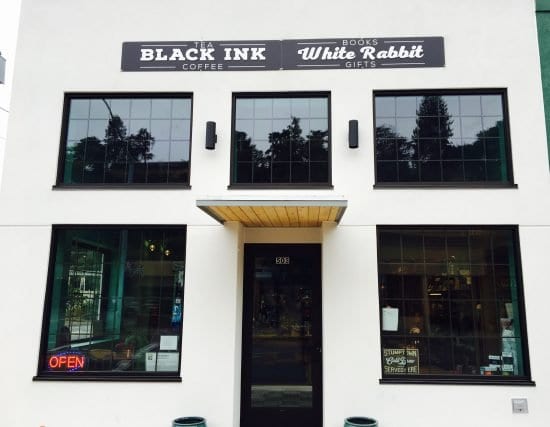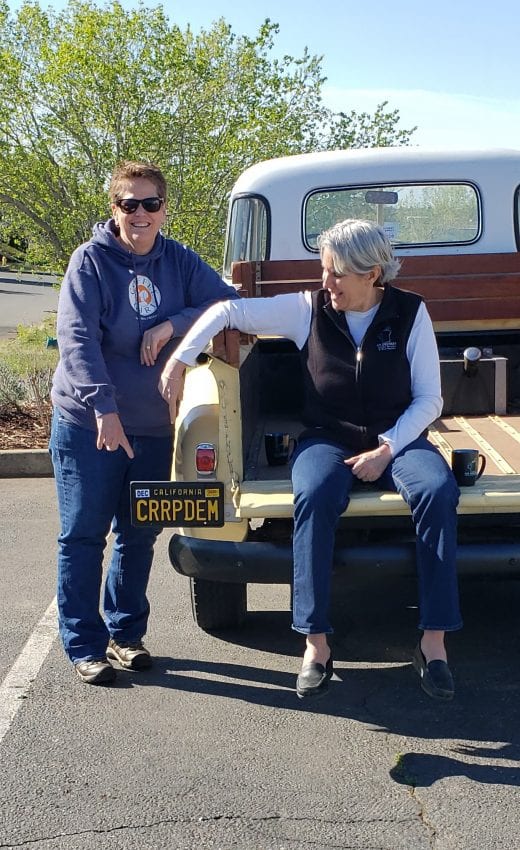
Wildfire season is a new mainstay for cafés on the West Coast of the United States.
BY MARK VAN STREEFKERK
SPECIAL TO BARISTA MAGAZINE ONLINE
Cover photo by Lisa Halcom
This year’s wildfire season was a cruel blow for cafés in California, Oregon, and Washington state. West Coast cafés that survived the initial shock of COVID-19-related shutdowns, and modified operations accordingly, were now dealing with the fire crisis. Fires that started in August and before blanketed Southern California, the Bay Area, and surrounding cities with smoke, apocalyptic skies, and hazardous pollution levels. Oregon and Washington were dealing with their own local fires in addition to the smoke from California. Lingering for 10 days starting around September 10, hazardous smoke levels in Portland, Ore., were literally off the charts. This year more than 6.6 million acres have burned on the West Coast, at least 37 people have died, and thousands have evacuated.
In Oregon City, Ore., Rolland Walsh, owner of Black Ink Coffee, and his wife, Danielle, who owns the bookstore that houses the café, had to evacuate their home as the fires raged nearby. They live close to the café and bookstore, which wasn’t in the evacuation zone at that time. “We were only (evacuated) for four or five days, but it came on so quickly we just had to shut things down,” Rolland says.

Due to COVID-19, Black Ink’s staff was already down “25 or 30%” from last year, and Rolland kept in close communication with the team throughout the crisis. He had provided them N95 masks to wear, and offered the café as a safe place to regroup if they needed to evacuate. “Luckily the shop was not in a Go Zone, it was in a Prepare Zone, so it was like, ‘If you need to come here, we will help you get through any sort of emergency.’”
Black Ink’s temporary closure meant losing a week’s profits, but the air quality alone was enough to justify staying closed. “It was over 400 or 500 (air quality index) for much of that week,” Rolland says, “We would be constantly opening and closing the doors of the shop; there would just be no way to keep the employees safe from the smoke.”
For Amy Louis and Elizabeth Goldblatt, co-founders of Six Degrees Coffee & Distribution in Chico, Calif., fire season is just part of the year now, but the added difficulties of COVID-19 and Pacific Gas and Electric’s rolling blackouts make for an all-new “sh*tshow.” Cafés first pivoted to takeout and outdoor seating due to the pandemic, but with smoke from surrounding areas creating hazardous air quality, outdoor seating was no longer an option. Held responsible for 2018’s Paradise Camp Fire, PG&E hopes cutting off power intermittently will help prevent wildfires. The unpredictable possibility of a power outage, sometimes up to seven days, is a nightmare for cafés and roasters. “If you’ve got a three-group La Marzocco and your power goes down, you’re screwed,” Amy says. “The name of the game is getting ahead of it and making sure that you have generators that can keep the water up in the boilers and (keep) refrigeration so you’re not losing your dairy.”

While thankfully coffee drinkers are a devoted (and addicted) group, the multiple threats of fires/smoke, COVID-19, and power outages are pushing resourcefulness to the brink. If you own or work at a café on the West Coast, it’s likely that some version of fire season is going to be a yearly thing, especially as we experience more drastic effects of climate change. Here are five tips for dealing with fire season:
Have a plan. Once the air quality index (AQI) outside gets over 150, close the doors and windows of your café. If the AQI approaches 200 or more, consider doing takeout or online ordering only, with the goal to reduce opening and closing the door. You can check your area’s AQI here.
Upgrade your HVAC system and/or get an air purifier. Purchase a HEPA air purifier for your café. Upgrading your HVAC system and using an air purifier have been shown to reduce harmful particles in the air, including viruses and smoke. If you don’t own the building, ask your landlord to update the HVAC system.
Get a PurpleAir sensor for your café. PurpleAir has both indoor and outdoor air sensors. Measuring air particulate matter, these sensors transmit data to their online map, making accurate, real-time readings accessible to everyone. Having your own air sensor is an excellent way to keep customers up-to-date about any changes based on AQI, and a great way to advertise the safety of your indoor air if you have an indoor sensor.
Get a standby generator. If your café is located in rolling blackout territory, you’ll want to get a generator to power your espresso machine, computers, and refrigeration units. Standby generators will automatically switch on when the power goes down—which is ideal for coffee machines.
Up your customer service game. For folks who have been stuck indoors due to smoke or COVID-19, leaving their homes feels like an extra-special outing, and grabbing coffee might be a rare instance of human connection. “The days of being pretentious in the café world, in my opinion, are gone,” Amy says. “Your customer service has to be impeccable right now. You have to be the joy that people see when they come into the café because people are really down right now … (asking) ‘How are you doing today?’ and really meaning it is more important than ever.”

ABOUT THE AUTHOR
Mark Van Streefkerk is Barista Magazine’s social media content developer and a frequent contributor. He is also a freelance writer, social media manager, and novelist based out of Seattle. If Mark isn’t writing, he’s probably biking to his favorite vegan restaurant. Find out more on his website.
